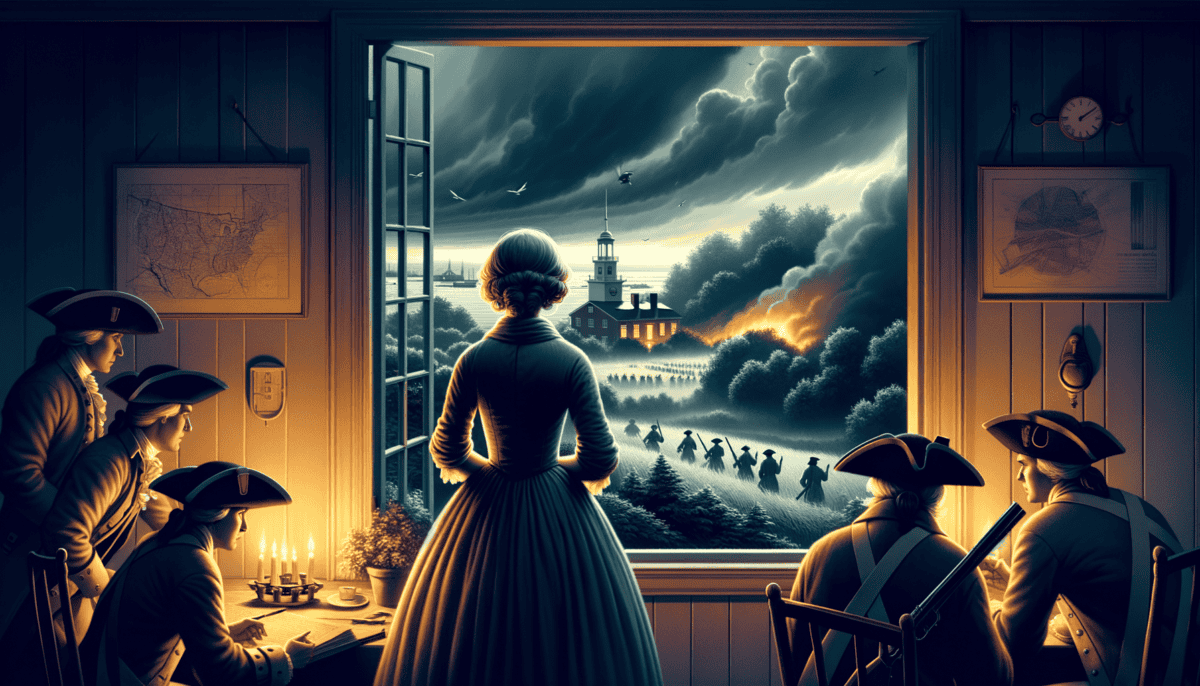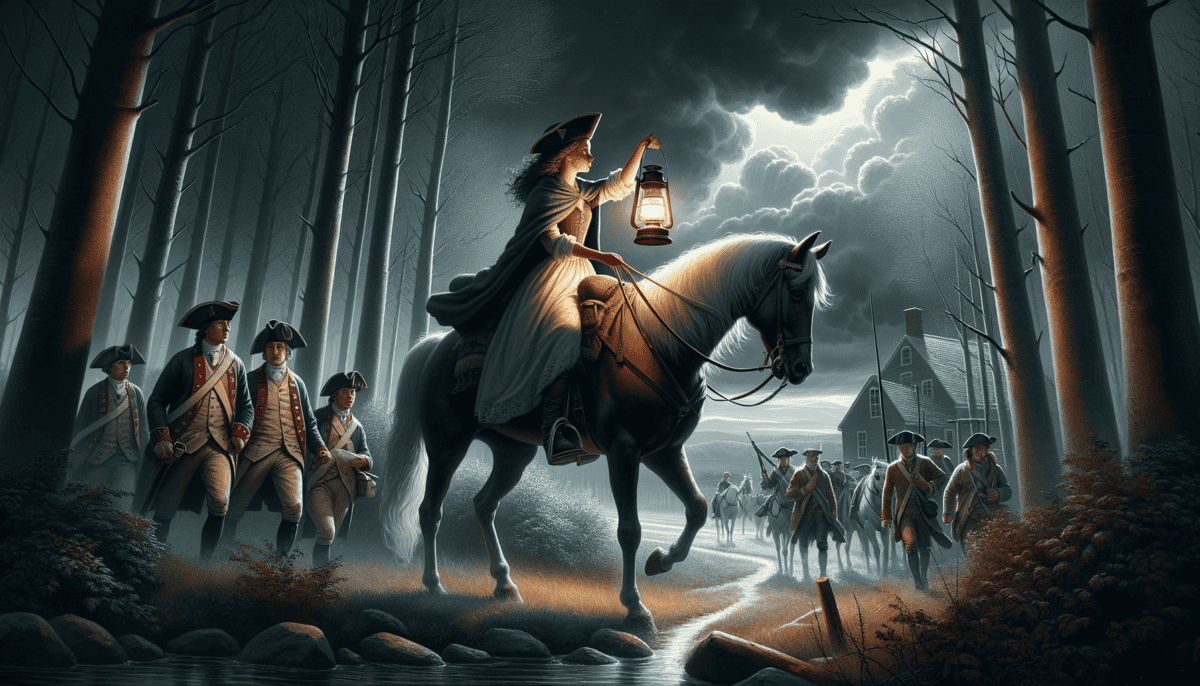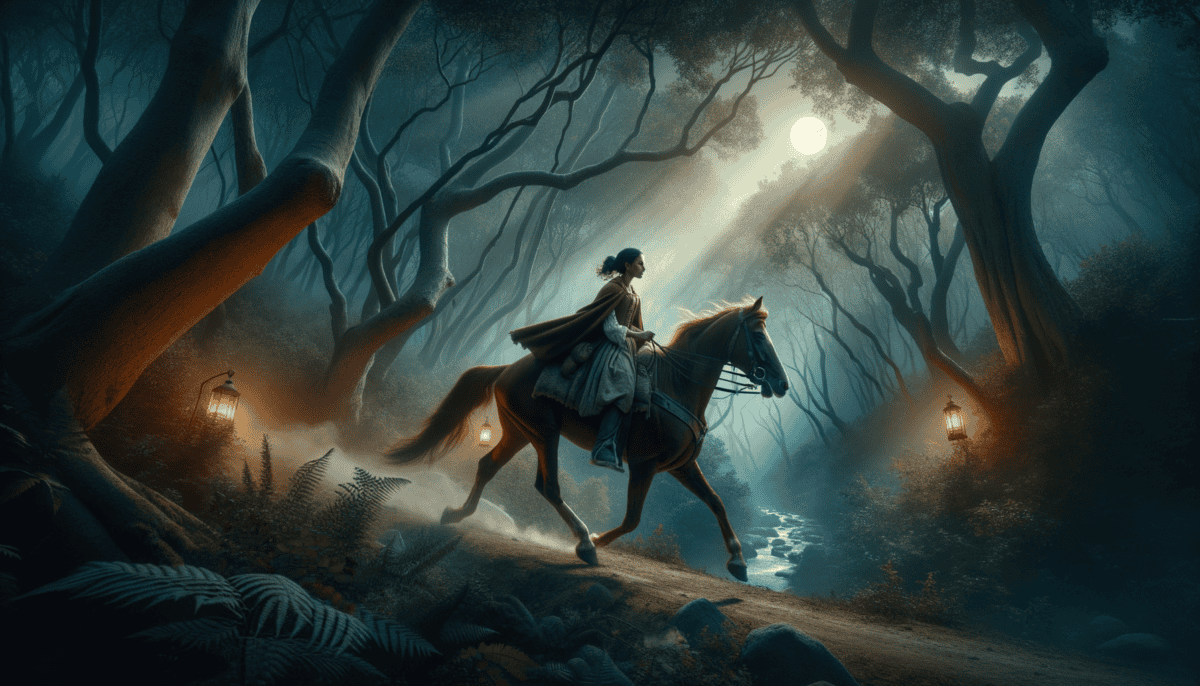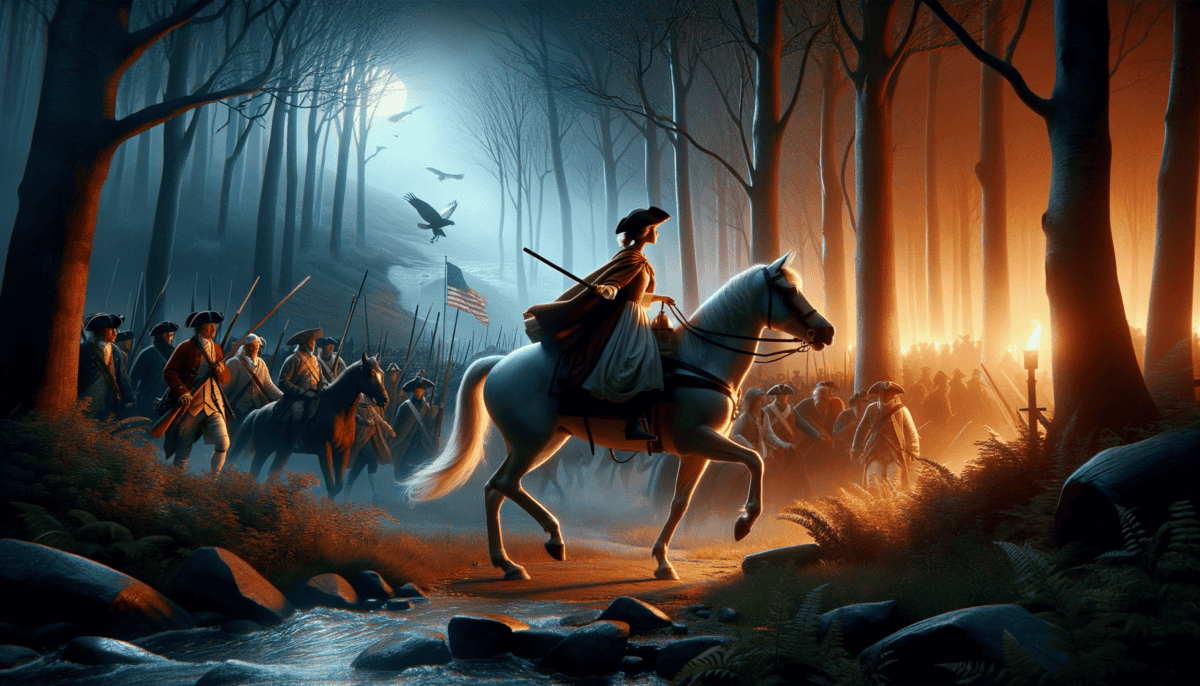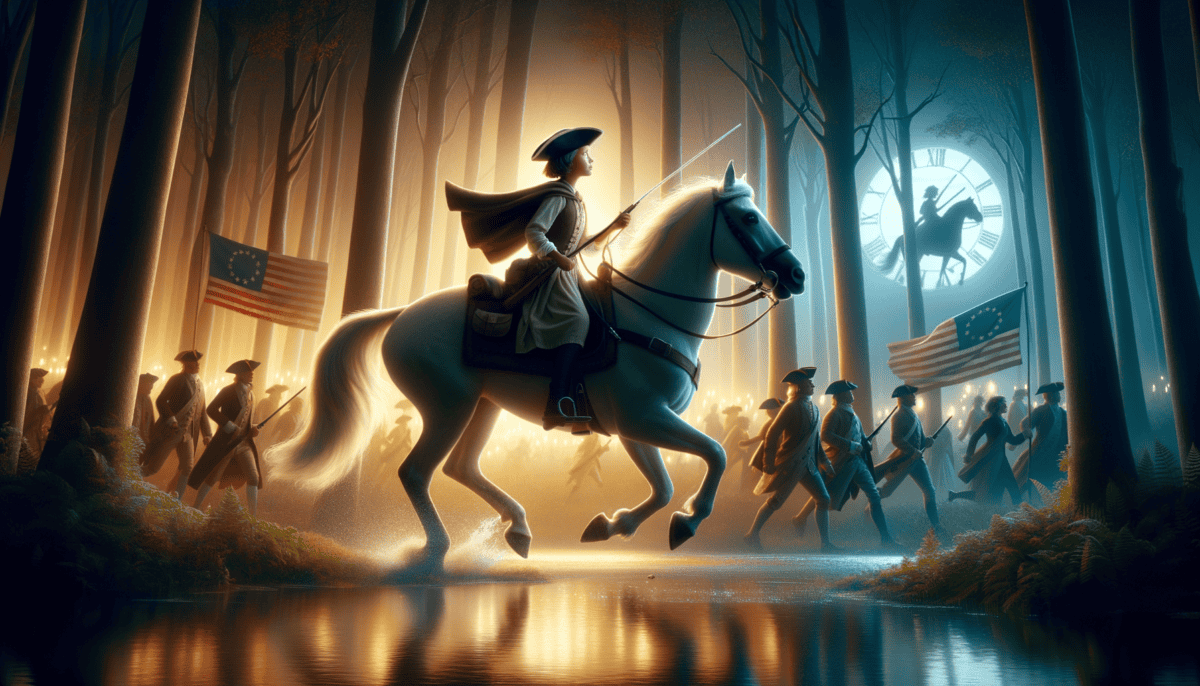A Daughter of Rebellion
On a crisp spring morning in 1761, baby Sybil opened her eyes to a world filled with excitement and change. Her home in Fredericksburg, New York, sat nestled among rolling hills and tall trees.
"She has the spirit of a warrior," Abigail Ludington whispered, cradling her newborn daughter. Henry Ludington, Sybil's father, stood proudly beside them. He was a tall man with kind eyes and strong hands that had already done much work for their growing nation.
As Sybil grew, she watched her father lead the local militia. He would often return home with important news about the growing tension between the colonies and Britain. Little Sybil loved to sit by the fireplace and listen to these grown-up talks.
"Papa, tell me again about why we need to be free," young Sybil would say, her bright eyes shining in the firelight.
Henry smiled at his daughter's curiosity. "We want to make our own choices, sweet girl. To build a country where everyone can live free and happy."
By the time Sybil turned fifteen, she had grown into a clever and brave young woman. She could ride a horse better than most boys her age, and she knew every path and stream near their home. Her father now trusted her with important tasks, like helping to manage their mill and taking care of her younger siblings.
The Ludington house became a busy place. People would come and go, bringing news about British soldiers and secret meetings. Sybil learned to recognize the different knocks at their door:
- Three quick taps meant a friend
- One long, two short meant urgent news
- A single heavy knock could mean trouble
"Stay alert, Sybil," her father would say. "These are dangerous times, and we must all do our part."
At night, Sybil would sometimes climb to her favorite spot in the house, a small window that looked out over the countryside. From there, she could see the lights of distant farms and imagine what it would be like when America became free.
"One day," she whispered to herself, "I'll do something important to help our cause. I just know it."
Her mother caught her there one evening and wrapped a warm shawl around her shoulders. "You remind me so much of your father," Abigail said softly. "Always watching, always ready."
The year was 1777, and spring was coming again to New York. No one knew it yet, but Sybil Ludington was about to become a hero of the American Revolution. Her greatest test would come on a dark night when everything seemed lost, and only her courage could save the day.
The Brewing Storm
Spring rain tapped against the windows of the Ludington home as Sybil helped her mother prepare dinner. The smell of fresh bread filled the kitchen, but worry filled the air. ️
“Papa seems troubled lately,” Sybil said, kneading dough with strong hands.
Abigail nodded. “The British have been moving supplies into Danbury. Your father thinks they’re planning something big.”
That evening, Colonel Henry Ludington called a family meeting. The children gathered around the large wooden table, their faces glowing in candlelight. ️
“Things are changing quickly,” Henry explained, spreading out a rough map. “The British ships have been spotted near the coast. We must be ready.”
Sybil traced the roads on the map with her finger. She knew these paths well – every turn, every creek crossing, every farmhouse. Her father had taught her to memorize them all.
“Knowledge of the land might save your life one day,” he always said.
The next few weeks brought strange visitors to their door. Men in travel-worn clothes would arrive after dark, speaking in hushed voices with Colonel Ludington. Sybil learned to read their expressions:
- Furrowed brows meant bad news from the coast
- Quick glances meant British patrols were nearby
- Determined faces meant plans were being made
One rainy afternoon, Sybil overheard an important conversation while sweeping near her father’s study.
“The British have thousands of soldiers,” a breathless messenger reported. “They could strike anywhere along the coast.”
Colonel Ludington’s voice was firm. “Then we’ll be ready everywhere. I’ve stationed lookouts from here to the shore.”
Sybil’s heart beat faster. She knew every one of those lookouts – farmers, shopkeepers, even some boys not much older than herself. They were all part of her father’s militia network.
That night, as Sybil brushed her horse Star, she whispered in his ear. “We might be needed soon, boy. We must stay strong and ready.” The horse nickered softly, as if understanding.
The next morning brought more signs of trouble. British ships were spotted getting closer to shore. Colonel Ludington’s militia men practiced their signals:
❗ One shot meant “Be alert!”
❗❗ Two shots meant “Gather quickly!”
❗❗❗ Three shots meant “The enemy is here!”
As April drew to a close, everyone could feel something big was coming. The air itself seemed to crackle with tension, like the moment before a thunderstorm. Sybil kept Star well-fed and ready, checking his saddle each night before bed.
“Do you really think the British will attack Danbury?” her younger sister asked one evening.
Sybil looked out at the darkening sky. “I don’t know,” she answered truthfully. “But if they do, we’ll be ready.”
She couldn’t have known then just how ready she would need to be, or that her moment of truth was racing toward her faster than anyone could imagine. The storm was about to break, and Sybil Ludington would ride right into its heart.
The Urgent Message
The evening of April 26, 1777, started like any other. Sybil was helping her siblings get ready for bed when loud knocks echoed through the house.
“Colonel Ludington! Colonel Ludington!” a man’s voice called desperately.
Sybil rushed downstairs with her father. A rain-soaked messenger stood in the doorway, gasping for breath. His eyes were wide with fear.
“The British… they’re burning Danbury!” he panted. “Governor Tryon’s men… they’re destroying everything!”
Colonel Ludington’s face turned grave. “How many British troops?”
“Two thousand strong, sir. They’re burning our food, our medicine, everything we need for the army!”
Colonel Ludington paced the floor. “We must gather the militia – but our men are scattered across forty miles. The messenger is too exhausted to ride further…”
Sybil stepped forward, her heart pounding. “I’ll go, Father. I know all the roads. I can warn everyone!”
“But Sybil, it’s dangerous! It’s dark, raining, and there are British soldiers and outlaws about.” Her mother’s voice shook with worry. ️
“That’s exactly why I should go,” Sybil insisted. “I know every path, every shortcut. The British won’t expect a girl to be carrying military messages.”
Colonel Ludington nodded slowly. “Very well. But you must be swift and silent. Lives depend on it.”
Sybil rushed to prepare. She put on her warmest dress and grabbed her father’s stick to knock on doors. Star seemed to sense the urgency as she saddled him.
“Here’s the route you must take,” her father said, showing her the map one last time. “Tell every militia man: ‘Muster at Ludington’s at daybreak!'”
The Journey Begins
As Sybil mounted Star, her mother pressed a small lantern into her hands. “Stay safe, my brave girl.”
The night was pitch black. Rain poured down as Sybil and Star set off into the darkness. Their first stop would be the Smalley farm, then the Haviland house, spreading out in a great circle through the countryside.
Before she disappeared into the night, Sybil heard her father’s last words:
“Remember, you’re not just carrying a message – you’re carrying hope for our cause!”
Thunder rolled overhead as Sybil spurred Star forward. The real test of her courage was just beginning. She tucked the lantern close, its tiny flame the only light guiding her way through the stormy night.
Each hoofbeat took her further from safety, deeper into danger. But Sybil Ludington didn’t feel afraid. She felt ready. This was her moment to prove that even a young girl could be a hero for freedom.
Star’s powerful stride carried them into the darkness, where history awaited. The midnight ride of Sybil Ludington had begun.
Midnight Journey
Rain stung Sybil’s face as Star galloped through the darkness. Her lantern swung wildly, casting dancing shadows on the muddy road. ️
“Faster, Star!” she whispered, leaning close to her horse’s ear. “We must hurry!”
At the first farmhouse, Sybil banged her stick against the door. “Wake up! The British are burning Danbury! Muster at Ludington’s by daybreak!”
A sleepy farmer appeared. “Child, what are you doing out in this weather?”
“There’s no time to explain! Spread the word – we need every soldier!”
Dangers in the Dark
Something rustled in the bushes. Star tensed, ears pricking forward. Sybil held her breath. Was it British soldiers? Or maybe the dangerous “Skinners” – outlaws who roamed the countryside?
Stay calm, she told herself. You’re doing this for freedom.
House by house, farm by farm, Sybil spread the alarm. Her dress was soaked, her hands numb from cold. But she didn’t stop.
“Who goes there?” a gruff voice called from the darkness.
“Colonel Ludington’s daughter! The British are attacking Danbury!”
Near midnight, Star stumbled on the slippery path. “Easy, boy,” Sybil soothed, patting his neck. “We can do this.”
A Test of Courage
“Halt!” The command came from shadowy figures ahead.
Sybil’s heart raced. Without hesitation, she turned Star down a hidden trail she knew. They crashed through undergrowth as shouts faded behind them.
“Good boy, Star,” she whispered. “You’re so brave.”
• Knowing every road and path
• Her trusted horse, Star
• Her father’s wooden stick
• Her strong belief in freedom
Hours passed. Sybil’s muscles ached. Her throat was raw from calling out in the rain. But still she rode on.
Dawn Approaches
The first hint of gray touched the sky. Sybil could see Star’s steam rising in the cold morning air. They were almost done!
“Just a few more houses,” she encouraged her tired horse. “Then we can rest.”
As the sun peeked over the horizon, Sybil and Star finally turned toward home. Behind them, the countryside was awakening. Militia men grabbed their guns and headed to Colonel Ludington’s house.
Sybil had ridden through rain and danger, covering 40 miles in one night. She had warned hundreds of people. Now it was time for the soldiers to do their part.
Star’s hooves clattered on the familiar path home. Sybil sat straighter in the saddle, tired but proud. She had done what seemed impossible. A sixteen-year-old girl had become a hero of the American Revolution.
Rally and Resistance
The sun was rising as Sybil and Star trotted into her family’s yard. Her father rushed out to meet them.
“Sybil! Thank heavens you’re safe!” Colonel Ludington caught her as she slid wearily from the saddle.
“Did I do it, Father? Will enough men come?”
“Come look!” Her father led her to the front porch. Through the morning mist, Sybil could see men hurrying down every road toward their house.
“You did it, my brave girl. Over 400 men are gathering because of you!”
The Battle Begins
Colonel Ludington organized the militia quickly. “Thanks to my daughter’s warning, we can meet the British before they escape!”
The soldiers cheered for Sybil. She blushed, not used to such attention.
“Never saw such bravery in my life,” one old farmer said. “That girl’s got more courage than most grown men!”
While Sybil rested, the militia marched toward Danbury. They found the British soldiers trying to return to their ships.
News of Victory
Later that day, a messenger brought exciting news. “We pushed them back! The British lost many men and supplies!”
“And our militia?” Sybil asked anxiously.
“Strong and proud, thanks to you, Miss Ludington. Your midnight ride saved us from disaster!”
• 400 militia men gathered
• British forces surprised
• Important supplies saved
• American spirits lifted
A Hero’s Welcome
“Sybil! Sybil!” Children ran up to her in town. “Tell us about your midnight ride!”
She smiled, remembering the dangerous journey. “I just did what needed to be done.”
“But weren’t you scared?” a little girl asked.
“Being brave doesn’t mean you’re not scared. It means you do what’s right even when you are scared.”
Recognition
General George Washington himself came to thank Sybil! “Your courage has served our cause well, Miss Ludington.”
Sybil curtsied, her cheeks pink with pride. “I only wish to see America free, sir.”
“Remember this day,” Washington told the gathered crowd. “Remember how one young girl’s bravery helped turn the tide of war.”
That evening, Sybil sat on her porch, watching the sunset. Star grazed peacefully in the meadow. Her muscles still ached from the long ride, but her heart was full. She had proved that even a young girl could make a difference in the fight for freedom.
“Ready for another adventure?” she whispered to Star.
The faithful horse lifted his head and nickered softly, as if to say, “Always, Sybil. Always.”
Legacy of Courage
Years passed, and Sybil’s brave midnight ride became a cherished story. As she grew older, her children and grandchildren would gather around to hear about that remarkable night.
“Tell us again, Grandmother Sybil!” they would beg. “About you and Star!”
“Well,” Sybil would begin, her eyes twinkling, “it was a dark and stormy night when freedom called…”
A Story That Lives On
Schools began teaching about Sybil’s courage. Children would act out her famous ride in plays.
“She rode twice as far as Paul Revere,” teachers would say, “and she was only sixteen!”
Towns put up statues of Sybil on her brave horse Star. One stands tall in Carmel, New York, showing her pointing the way forward, just as she did that night.
Inspiring Others
“What made you decide to ride?” a young girl once asked her.
Sybil smiled warmly. “Sometimes the right thing to do is also the scary thing. But that’s what makes it brave.” ⭐
A Changed World
America won its freedom, and Sybil lived to see the country she helped create grow strong. She married Edmund Ogden and had a son named Henry. They lived on a farm in Catskill, New York.
Whenever travelers passed through, they would point and whisper, “That’s her – the girl who rode through the night to save her people!”
• Books about her story
• Statues and memorials
• School plays and lessons
• Historical markers
The Last Ride
On February 26, 1839, Sybil took her final journey. But her story remained alive in the hearts of Americans.
“What would Sybil do?” became a saying when people needed courage.
“She proved that heroes come in all sizes,” historians would write. “And that one person’s bravery can change history.”
Today, children still learn about the brave girl who rode through darkness to light the way to freedom. Her legacy reminds us that courage knows no age, and that even the youngest among us can make a difference.
And somewhere, in the endless night of history, a sixteen-year-old girl still rides, calling out through the storm, forever showing us the way to be brave.


